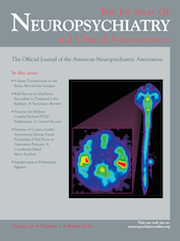A 19-year-old male patient with mild developmental intellectual impairment, with nil contributory family history of mental illness and no personal history of substance abuse, presented to the psychiatry outpatient department (OPD) of R. G. Kar Medical College, Kolkata, with a syndromal manic state for 2 weeks. He was a diagnosed case of WD, starting at age around age 14 with movement disorder, and this was under control on penicillamine 250 mg 3 times daily for the last 4 years. The patient was off medication for 2 months before current presentation and had no worsening of motor symptoms other than abnormal behaviors. Before the current presentation, he had no convulsion, head injury, high fever, vomiting, or jaundice. In the OPD, he was diagnosed as organic manic disorder
4 and was prescribed olanzapine 10 mg once daily, sodium valproate 200 mg 3 times daily, along with penicillamine in the previous dosage. The patient went home without buying penicillamine and continued only psychotropics, which were provided free of cost from the hospital. The patient came back to the OPD within a week with gross extrapyramidal symptoms and uncontrolled mania. The patient was admitted and put on intravenous fluid with injectable lorazepam 4 mg twice daily, with omission of previous psychotropics and addition of penicillamine 250 mg/3 times daily. Screening of blood count, sugar, electrolytes, creatinine, liver function test, creatine phosphokinase, CT brain scan, and EEG were within normal limits. His extrapyramidal symptoms recovered in the next few days. He was continued only on penicillamine with tapering dose of oral lorazepam, and zinc was added by neurologists. The patient’s manic symptoms started resolving without adding any other psychotropics and were remitted by the next 4 weeks. Over next 1-year follow-up, the patient was maintained only on penicillamine and zinc and was free from both mental and physical symptoms of WD.
In this case, psychiatric manifestations appeared in the course of WD without any worsening of motor manifestations, which is quite rare.
1 Emergence of manic symptoms on omission of penicillamine and remission after reinstitution confirms it to be a primary neuropsychiatric manifestation of WD. This case also signifies that only optimization of primary management with chelating agents may suffice for controlling psychiatric manifestations in WD. This agrees well with the concept of organic psychosis.
4 This is important to reduce unnecessary health costs and the burden of side effects of psychotropics
5 in these cases.

